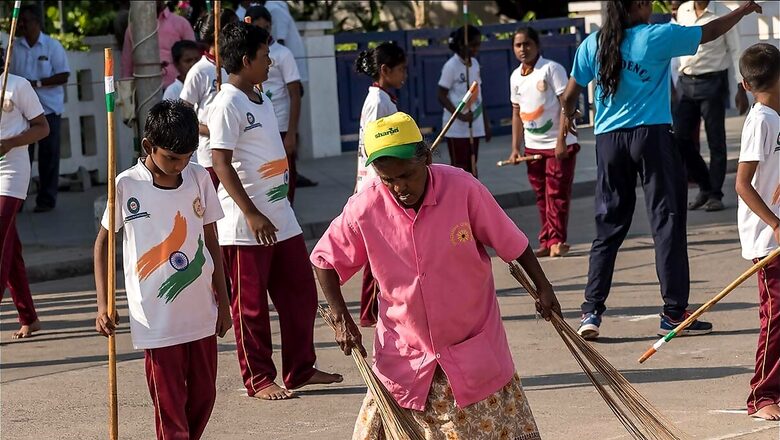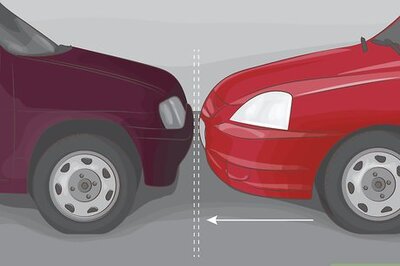
views
Behind closed doors, hidden from the public eye, and seldom spoken about, women sanitation workers in India toil relentlessly to keep our streets and toilets clean and hygienic. Theirs is a crucial yet underappreciated role in society, one that often comes with its unique set of challenges.
Traditionally, sanitation work in India has been associated with the lowest rungs of the caste system, overcoming which, in itself, continues to be a long-term battle for India. The caste system codifies jobs into family history because other opportunities aren’t open to them. For sanitation workers, this is particularly relevant, as there are certain communities whose very identity revolves around sanitation work, and as a result of which, they face social stigma, isolation, discrimination and exclusion… trapping them in a cycle of poverty.
In this context, women sanitation workers stand out as change-makers, for their role in challenging these age-old taboos.
Overcoming Adversities and Breaking Stereotypes Brick by Brick
One of the most significant taboos these women challenge is the stereotype of “women’s work.” In a country where traditional gender roles are deeply ingrained, women sanitation workers defy convention by working in roles historically reserved for men. Moreover, women aren’t expected to be ‘breadwinners’, even when they often have to be.
Women sanitation workers also face immense stigma arising from societal norms and prejudices. They also grapple with health risks and challenging working conditions. Sanitation work is physically demanding, and it exposes workers to unsanitary conditions, toxins, and diseases. Many women sanitation workers don’t have access to proper protective gear, and no healthcare benefits. They often lack toilet access themselves, and this can make their work even more challenging.
Take the case of Tara Devanand Koli, who used to clean toilets in homes for just Rs 100. She was known for taking on tasks that others refused to do. Her journey took a positive turn after enrolling in Harpic World Toilet Colleges’ (HWTC) training program. Tara’s newfound confidence allowed her to seek better opportunities and secure a job at Hedgewar Hospital, Aurangabad. Here, Tara volunteered to clean COVID-19 wards, and before she knew it, she even had a promotion at hand. In the middle of the pandemic, while people were losing jobs, left, right and centre, Tara got promoted to Senior Housekeeper in the hospital and was also awarded Best Employee.
Now that she has a great job, and a uniform to go with it, she commands the respect that was always her due.
Changing Perceptions, One Toilet at a Time
The work of women sanitation workers is about much more than just cleaning. It’s about changing perceptions and challenging deeply ingrained taboos, especially around toilet hygiene and access.
The story of Mangalbai Daulat Bavaskar, a sanitation worker from Aurangabad, is a testament to this transformation. After the loss of her husband, she faced the daunting task of providing for her family. Mangalbai did not back down from this challenge. Instead, she displayed remarkable leadership qualities, advocating for improved sanitation practices in her community.
Her efforts bore fruit as she successfully improved sanitation in her town. What started as a contractual sanitation job evolved into a permanent position, leading to her promotion as a supervisor. Mangalbai’s journey showcases how women sanitation workers are not just passive participants in their roles but active agents of change, influencing their communities and inspiring others.
Creating Role Models
Before the Swachh Bharat Mission, stories of recognition for sanitation workers were few and far between. One such story is that of Usha Chaumar, a former sanitation worker who received the Padma Shri award for her work in uplifting women in sanitation. Today, she is the President of Sulabh International Social Service Organisation, the non-profit arm of Sulabh International, but that wasn’t always the case.
She began cleaning toilets at the tender age of 7, earning a mere Rs 10 per month from each household. Her life changed when she met the founder of Sulabh International, Dr. Bindeshwar Pathak, who encouraged her to join the NGO Nai Disha, in search of a more sustainable lifestyle.
In addition to the work she has done in inspiring and enabling thousands of other sanitation workers like herself, she has also been able to create a much better life for her own family – her oldest son is pursuing a postgraduate degree, something she knows he wouldn’t have had access to, without the choices she made.
How Can We Create a Pipeline Towards a Better Life for Sanitation Workers?
This was the question Harpic set out to solve. As India’s leading brand in the lavatory care space, Harpic has a keen understanding of the problems that sanitation workers face – at work, and outside. This intention is what powered the creation of HWTC in 2016.
HWTC was established with the stated objective of improving the quality of life of sanitation workers through their rehabilitation by linking them with dignified livelihood options. Workers trained by the college are provided placement with various organisations. Following the successful proof of concept in Rishikesh, HWTCs have opened in Maharashtra, Aurangabad, in partnership with Harpic, Jagran Pehel and Maharashtra Government.
Of course, Harpic also partnered with News18 in Mission Swachhta aur Paani, a movement that champions the cause of inclusive sanitation, equality for all genders, abilities, castes and classes and the strong belief that clean toilets are a shared responsibility.
Mission Swachhta aur Paani creates the space for dialogue on key issues regarding toilet access and toilet hygiene, and the problems that sanitation workers face. These discussions involve government officials, NGOs, activists, sanitation workers, educators and members of the public with the aim to come up with solutions that really work, and with the secondary aim to create more awareness for the rest of us, who never give these women a second thought.
It’s time to give this problem our attention. We owe our health to these women, after all. There is so much that we can do – from writing to our local elected officials, to championing their cause in our housing societies, to simply raising awareness about the issues they face within our families, and our social circles. Each conversation counts.
Join us here, to learn about how you can be part of this movement that brings respect, justice and a better life to women sanitation workers.




















Comments
0 comment